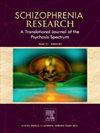Perceived social support in parents with schizophrenia or bipolar disorder and their co-parents: The Danish high risk and resilience study VIA 7
IF 3.6
2区 医学
Q1 PSYCHIATRY
引用次数: 0
Abstract
Background
Lack of social support is a risk factor for symptom recurrence and poor prognosis for individuals with severe mental disorders. Compared to healthy populations, individuals with schizophrenia or bipolar disorder are more likely to perceive lower levels of social support. Evidence is needed on perceived social support in parents with schizophrenia or bipolar disorder and their co-parents.
Methods
Based on data from a population-based cohort study, The Danish High Risk and Resilience Study – VIA 7, we compared perceived social support measured with The Social Provisions Scale (SPS) in parents with schizophrenia (n = 148), their co-parents (n = 157), parents with bipolar disorder (n = 98), their co-parents (n = 89), and control parents (n = 359).
Results
We found lower levels of perceived social support in parents with schizophrenia and bipolar disorder compared with controls. Schizophrenia co-parents had lower levels of perceived social support compared to controls, but no difference was found between bipolar disorder co-parents and controls.
Conclusions
Low levels of perceived social support for these parents may pose an additional risk factor for their offspring in addition to the effects of genetic risk. Our results may inform future intervention studies and highlight the need for support for families with parental schizophrenia or bipolar disorder.
求助全文
约1分钟内获得全文
求助全文
来源期刊

Schizophrenia Research
医学-精神病学
CiteScore
7.50
自引率
8.90%
发文量
429
审稿时长
10.2 weeks
期刊介绍:
As official journal of the Schizophrenia International Research Society (SIRS) Schizophrenia Research is THE journal of choice for international researchers and clinicians to share their work with the global schizophrenia research community. More than 6000 institutes have online or print (or both) access to this journal - the largest specialist journal in the field, with the largest readership!
Schizophrenia Research''s time to first decision is as fast as 6 weeks and its publishing speed is as fast as 4 weeks until online publication (corrected proof/Article in Press) after acceptance and 14 weeks from acceptance until publication in a printed issue.
The journal publishes novel papers that really contribute to understanding the biology and treatment of schizophrenic disorders; Schizophrenia Research brings together biological, clinical and psychological research in order to stimulate the synthesis of findings from all disciplines involved in improving patient outcomes in schizophrenia.
 求助内容:
求助内容: 应助结果提醒方式:
应助结果提醒方式:


